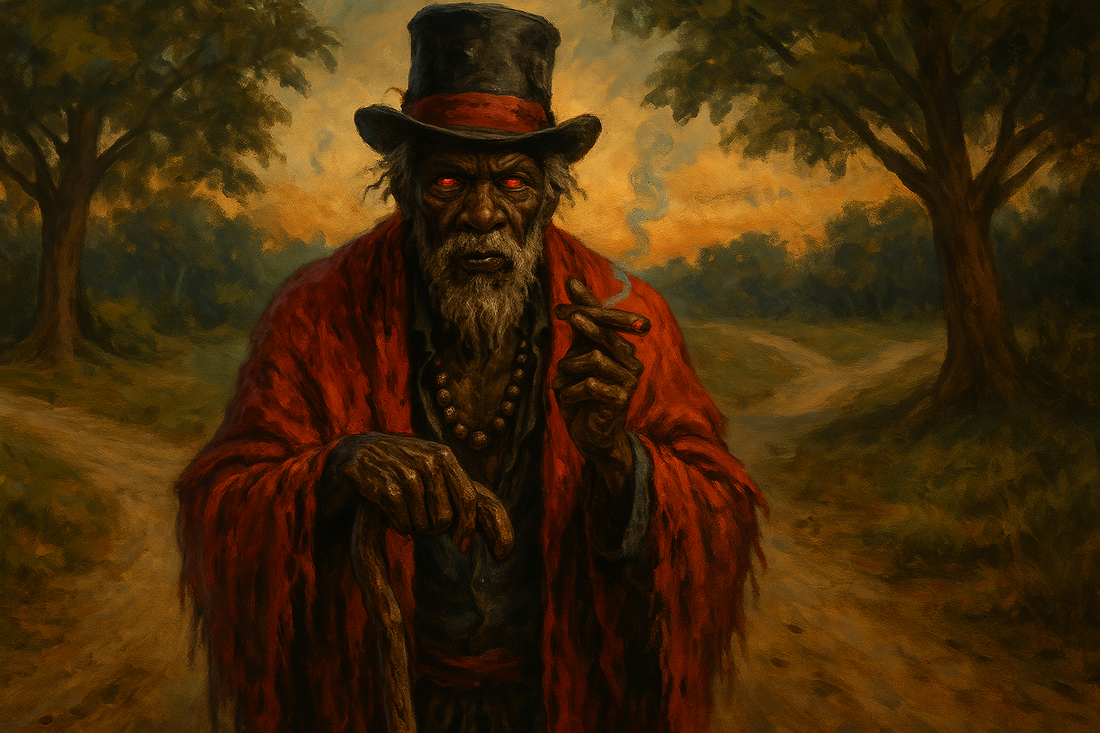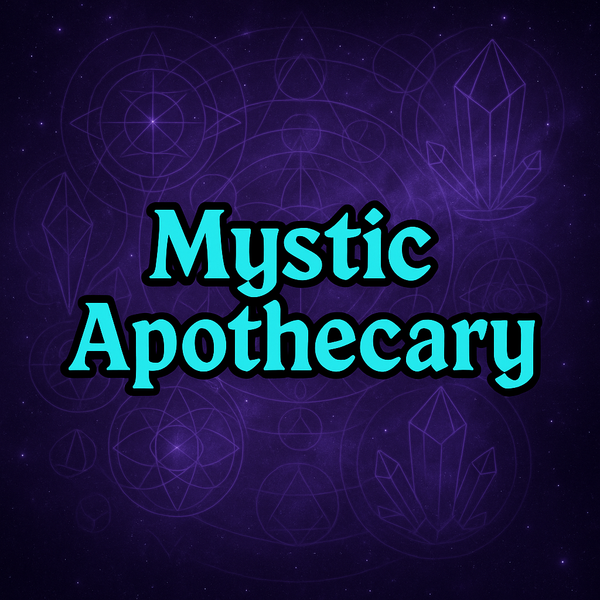
Papa Legba: Vodou Gatekeeper of the Spirit World
Cody ManesShare
Who is Papa Legba?
Papa Legba is one of the most important lwa spirits in Haitian Vodou. Known simply as Legba in many traditions, he is the gatekeeper at the crossroads, the place where the human world and the spirit world meet. Without Papa Legba’s permission, no one can speak to the other spirits. His role is central to every Vodou ceremony, and his presence is often invoked at the very start of rituals to ensure communication flows between realms. In some accounts he is seen standing with one foot in each world, symbolizing his unique ability to travel freely between them. Legends say his cane or crutch is more than a walking aid, acting as the key that opens spiritual gates and protects those who approach him with respect.
For those wondering “who is Papa Legba” or “who is Legba”, he is a messenger, translator, and guide whose work shapes the flow of every Vodou ceremony. He understands every language spoken by humans and spirits alike, and is said to interpret not just words but intent and emotion. In Haitian Vodou, Legba God is a term sometimes used by outsiders to describe his divine role, but practitioners see him as a powerful intermediary rather than a creator deity. Some traditions tell of his ability to grant safe passage through spiritual dangers, while others speak of him testing petitioners with riddles to ensure they are ready to walk the path they request.
The origins of Papa Legba
The Papa Legba origin story begins in West Africa, particularly in the Fon tradition of the old Kingdom of Dahomey, now Benin. There, he was a protector of gateways, a master of communication, and sometimes a trickster figure who tested the intentions of those who sought passage. In these traditions he was also linked to fertility, healing, and the protection of travelers. Through the transatlantic slave trade, his worship traveled to the Caribbean, where African beliefs blended with Catholic saints and local customs, often incorporating regional symbols, music, and ritual practices that enriched his role in new cultural contexts.
In Haitian Vodou, he is sometimes linked with Saint Peter, Saint Lazarus, or Saint Anthony, each association highlighting his role as a spiritual gatekeeper who controls access to higher realms. In Santería, Papa Legba in Santeria is often compared to Elegguá, though they are distinct spirits with different traditions and offerings. Elegguá, for example, is frequently represented as a youthful and playful energy, whereas Papa Legba is more often portrayed as an elder who carries wisdom from generations past. Some practitioners note that both share an affinity with the crossroads, yet the songs, symbols, and rituals devoted to each remain unique to their respective traditions.
Papa Legba in New Orleans and beyond
The image of Papa Legba New Orleans has taken on its own life, blending Haitian Vodou, Louisiana Voodoo, and pop culture into a distinct regional interpretation. The New Orleans Papa Legba is often depicted as an older man at the crossroads, wearing a straw hat and carrying a cane, sometimes with bright beads or a pipe as part of his presentation. Local folklore weaves his presence into stories of musicians making pacts for talent, and some Mardi Gras krewes have even honored him in parade themes. However, the way he appears in popular media is not always accurate, and shows like American Horror Story have confused Papa Legba with Baron Samedi, leading to misconceptions about his role and nature.
In reality, Papa Legba’s role in Papa Legba New Orleans Vodou is still that of the gatekeeper, the one who must be greeted first during rituals, and his salutation often sets the tone for the entire ceremony. In some New Orleans lineages, the greeting involves specific songs or drumming patterns unique to the region, and offerings may reflect local ingredients such as chicory coffee or Louisiana rum. His presence at the start is believed to clear spiritual pathways, ensure messages are delivered accurately, and protect the gathering from unwanted influences.
Papa Legba’s powers and role at the crossroads
The Papa Legba powers are rooted in communication, access, and the ability to influence the flow of events at critical moments. He decides who may pass through the Legba crossroads, also called the crossroads Legba or Papa Legba crossroads, and is believed to assess not only the words spoken but also the sincerity behind them. His staff or cane is a symbolic key that unlocks the way, and some traditions hold that it can also close doors to harmful influences, protect travelers on physical and spiritual journeys, and serve as a tool to redirect negative energies away from those under his care.
He is not only a gatekeeper. In some traditions, he is a trickster, a teacher, and a protector, using his wit to challenge people who approach him to ensure their requests are well considered. Many Papa Legba stories and Papa Legba true stories describe him helping people find clarity or guiding them away from danger, sometimes through subtle signs or unexpected encounters that later prove significant. A Papa Legba story often begins with an offering at dawn and ends with a path opening in unexpected ways, and in some tellings, the journey itself becomes a lesson in patience, humility, and the value of listening for guidance in ordinary moments.
Traditional Papa Legba and modern rituals
The traditional Papa Legba is honored with offerings of coffee, rum, tobacco, keys, or plantains, often chosen for their symbolic value and their ability to please him, as each item carries a meaning tied to his nature as a communicator and gatekeeper. Some houses also include sweets, fresh water, or seasonal fruits to reflect gratitude, abundance, and the cycles of nature he helps guide. In certain communities, offerings might also include regional items such as local spirits or breads made for feast days. A Papa Legba altar may include his colors — red and black, red and white, or yellow — along with his vèvè, a ritual drawing representing the crossroads, and personal items connected to communication such as old letters, keys from meaningful places, small bells to signal the opening of a path, or even carved walking sticks to represent his staff.
If you are asking what is Papa Legba, think of him as the first spirit to greet in ceremony, the opener of every sacred exchange. A Papa Legba ritual might involve singing his songs, drawing his vèvè, and making offerings before requesting his help, sometimes accompanied by rhythmic drumming that mirrors the heartbeat of the gathering. His feast day varies by tradition, with some celebrating a Papa Legba feast day on January 1 to align with new beginnings, while others honor him on Mondays or Wednesdays as days of spiritual opening. The phrase Papa Legba day often refers to whichever day a particular house or family has chosen to pay him homage, and in some communities the day includes storytelling, music, and processions meant to symbolize the paths he keeps open.
Variations and names for Papa Legba
Over time, many spellings and names have appeared in search of Papa Legba:
Papalegba, Legba Papa, Baba Legba, Papa Legbo, Papa Lega, Papa Leg A, Pap Legba, Papa Elegba, Papa.legba, Papalogba, Papà Legba, Papá Legba, Papa Legbas, Papa Ligba, Papa Legbs, Popa Legba, Papa Leghba, Pappa Legba.
These variations often arise from pronunciation differences, translation, or typing errors, and in some cases reflect regional dialects or the influence of related spirits in other traditions. In oral storytelling, slight shifts in pronunciation can carry layered meanings or signal specific attributes of Legba in that context. No matter the form, they all point to the same crossroads spirit who opens the way between the human and spiritual worlds.
Papa Legba’s place in history and culture
The Papa Legba history is one of resilience, adaptation, and cultural continuity. He has traveled from Africa to Haiti, New Orleans, and beyond, taking on new layers of meaning in each place while keeping his identity as the opener of the way. In Haiti he is central to Vodou ritual structure, in Louisiana he weaves into Creole folklore, and in popular culture his image sometimes carries echoes of both truth and fiction. He appears in blues lyrics, novels, folk stories, and oral histories, often symbolizing the power to choose a path or open an opportunity. People drawn to his image are often seeking guidance, luck, the courage to face life’s crossroads, or a reminder that every threshold can be a place of decision and transformation.
Honoring Papa Legba today
If you wish to greet Legba respectfully, keep it simple. A clean space, a candle, and a sincere word go further than elaborate displays made without understanding. Some practitioners add a small glass of fresh water or place his vèvè on the floor to symbolically open the way before speaking. When you stand at your own crossroads in life, think of the doorman at the gate who listens carefully before deciding to open the path. The right greeting can lead to the right path, and an honest request given with humility is believed to reach his ears more quickly.
